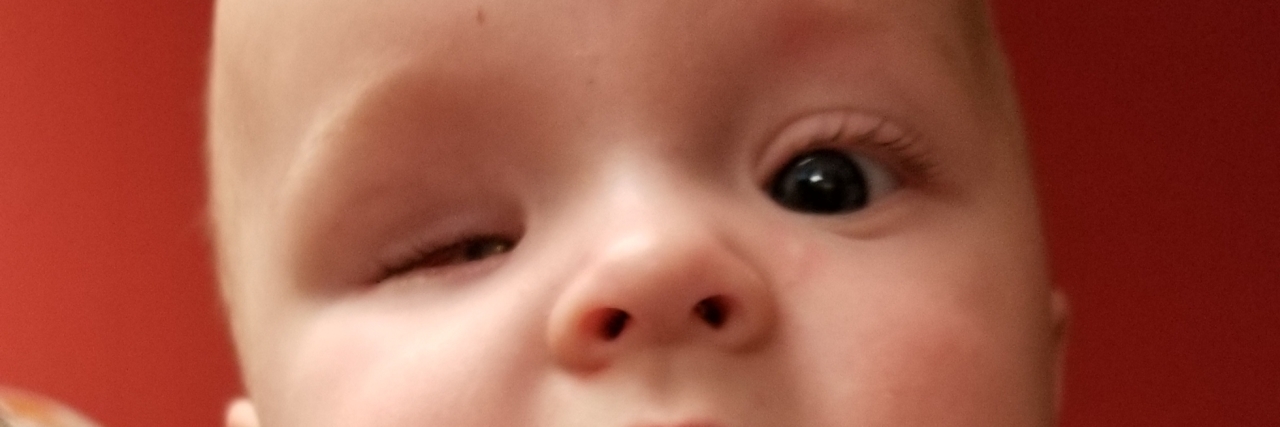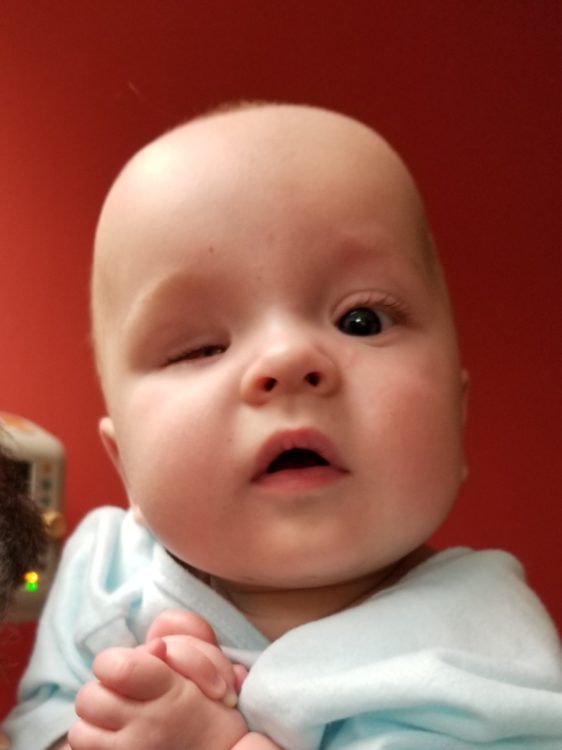Childbirth was a beautiful experience for me.
From the moment they cradled Scarlett in my arms after her first bath, we immediately noticed her right eye looked different. We asked the pediatric RN who was taking care of her, the midwife and even my nurse about it. They all said the same thing: it was swelling due to birth trauma. In the bliss of the moment, we didn’t question their answers. The pediatrician checked her out a few hours later during rounds and proclaimed all was well. Again, we asked about her right eye. She gave us the same answer we had already received. She was almost sunny side up, it was swelling from birth trauma. Surprisingly, this isn’t that uncommon for births with these conditions.
At 27 hours old, Scarlett ended up being sent to the level two NICU in the hospital that I delivered her in. Long story short, she was experiencing pulmonary hypertension. She ended up on oxygen and was constantly monitored. On her second and third days in the NICU, she made so much progress. Her day shift nurse was a RN who had been working in the nursery for 35 years. She helped ease my fears, answer my many questions, and celebrated Scarlett’s little victories with us.
Many times over the two days with Alice, we discussed Scarlett’s eye. She still was not opening her right eye at all. Despite the chaos of the NICU, hypertensive episodes (that scared us to death), and running back and forth between home and the hospital, we did not stop asking about her eye. We still got the same answers as before. Alice did finally get Scarlett’s eye lids open enough to take a peek and said she had a tiny eye in there. I had no clue so was being literal. There was too much going on for those words to fully register.
The next morning, I arrived in the NICU at 7:30, to find Scarlett back on oxygen. Holding back tears, Alice explained an hour earlier Scarlett had a particularly bad hypertensive episode. The call had been made to transfer her to the level one NICU at the children’s hospital a short drive away. Once we were settled in at the new hospital, we were informed that Scarlett would have a consultation with a pediatric ophthalmologist. Alice had come through when she called in the transfer orders. This amazing lady knew how badly we wanted answers about Scarlett’s eye. Two days later, we finally met Dr. Rama.
After the initial consult, Dr. Rama explained that she was bringing in a portable ultrasound machine to take a closer look at the eye. We were still in the dark but we knew answers were coming. After the ultrasound, the world is a blur. There were a lot of big words that I did not understand. All I knew, through my tears, was that my baby was blind in one eye and would require a prosthetic eye. I also knew that she was a proven fighter. I asked again for the names, reigning in my hormones and emotions as I spoke: persistent hyperplastic primary vitreous (PHPV), micropthalmia and a full white cataract. Dr. Rama grabbed my hand once my tears started again and told me there would be nothing that Scarlett couldn’t do.
Once Dr. Rama left, the Google searches began. I had to ask the nurse how to spell the conditions. When I searched for PHPV, all I could find was medical articles that were like trying to read a foreign language. Mircrophthalmia (which is basically a smaller than normal eye or eyes) and the cataract were a bit easier to find information on in layman’s terms. I spent the next two months wading through medical articles trying to decipher what exactly it was that my baby had. I would give up then a few days later be right back at it. At two months of age, I found or was directed to a few groups online. Then, I learned that PHPV had another name: persistent fetal vasculature (PFV). My Google searches opened up a little and I began to learn more information. I learned that is it a condition where the eye does not develop properly in the womb. It’s a rare condition. It is also common for these three conditions to occur together, although, they can occur separately. I learned all I could about eye prosthetics. I was absorbing information until I just could not take any more in.
Do not ever stop asking questions when you feel something is off. Our persistence in asking led to a nurse taking an extra look. Don’t give up just because you get told that it is “normal.” Trust your mom/dad instincts and ask again and again.
A version of this story originally appeared on PFV Kid Blog.
Image via Raina Ross


